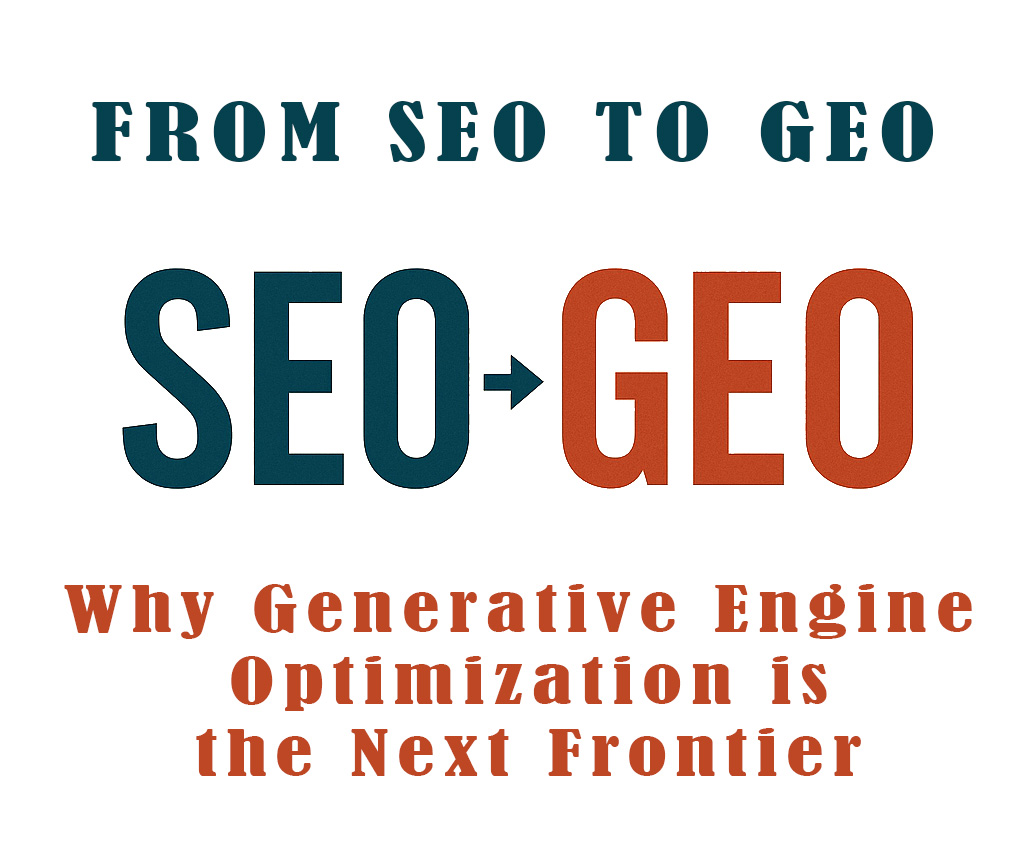TL;DR: Search is evolving from keyword lists to AI-generated answers. Generative Engine Optimization (GEO) builds on SEO to help your content appear inside those AI-driven responses. It’s not about ranking higher—it’s about being cited and trusted by generative engines like ChatGPT and Gemini. GEO emphasizes clear, structured, authoritative writing that machines can interpret and humans can trust. In short: keep doing SEO, but think in GEO—because visibility now depends on being used by AI, not just found by search.
From SEO to GEO: How Search Itself Is Being Rewritten
For more than two decades, digital visibility meant mastering the mechanics of search engine optimization. Keywords, backlinks, metadata, load speed, and mobile performance shaped how content rose through Google’s results. Those who understood the algorithm could help their content climb to the top of the page—and with it came visibility, traffic, and often, trust.
That system worked because people searched in predictable ways. They typed a few words, got a list of links, and clicked through. But the past two years have brought the most significant transformation in online discovery since Google itself arrived. Large language models—ChatGPT, Claude, Gemini, and others—are changing how people find answers. Instead of returning ranked lists of links, these tools synthesize and summarize. The “engine” no longer just retrieves; it generates.
From that shift, a new discipline is taking shape: Generative Engine Optimization (GEO). First defined in 2023 academic research and now embraced by marketing strategists, GEO focuses on how to make content visible, usable, and quotable within generative-AI responses. It’s about ensuring that when an AI composes an answer, it draws from your material and recognizes your authority.
A Complement, Not a Replacement
GEO doesn’t replace traditional SEO—it builds on it. Clean structure, speed, accessibility, and credible content remain essential. Search engines still crawl and index pages, and those same attributes help generative models interpret them.
What changes is the objective. SEO seeks high ranking in link lists; GEO aims for inclusion and citation within an AI-generated answer. Users may never click a link, so the question becomes: Will the AI quote you, paraphrase you, or pass you by?
Writing now requires dual fluency—clear, human communication and machine-readable structure. Each page teaches AI systems what your brand knows and how to describe you to others.
Why GEO Matters Now
Search behavior has shifted. People phrase full questions—“How can a small business build trust online?”—and generative systems favor content that mirrors that tone: conversational, structured, and authoritative.
At the same time, traffic patterns are evolving toward “zero-click” answers. The economic foundation of SEO—driving users to your site—is giving way to visibility within synthesized responses. GEO acknowledges this and reframes success around presence and citation, not just traffic counts.
Because the field is new, early adopters can build enduring authority. Once an AI recognizes your site as a trusted source, that association compounds with every new answer it generates.
Implications for Website Owners
For website owners, GEO begins with better questions. Each piece of content should clearly answer what your audience might ask an AI assistant. One page with clarity often outweighs ten stuffed with keywords.
Structured data—schema markup, descriptive headings, consistent metadata—helps machines interpret context. Credibility signals such as client testimonials, case studies, and third-party references strengthen your authority across both search and generative engines.
GEO rewards authenticity and clarity: traits that have always mattered but now define discoverability itself.
The New Measure of Visibility
The move from SEO to GEO marks a cultural shift. The web is no longer just indexed—it’s interpreted. Every clear paragraph you publish trains the systems that shape public understanding.
Being cited in an AI-generated answer delivers reputational value even without a click. It signals recognition as an authoritative voice in your field. The risk of ignoring GEO isn’t penalization—it’s invisibility.
Continue practicing SEO, but think in GEO. Make your content discoverable and usable by the engines that are now rewriting how people learn, search, and decide.

